What is Mechanical Engineering?
Mechanical engineering is a branch of engineering that focuses on the design, analysis, and manufacturing of mechanical systems. These systems can include anything from engines and power plants to robots and HVAC systems. Mechanical engineers use principles of physics and material science to create and improve mechanical devices and processes.
Key Concepts in Mechanical Engineering
- Statics and Dynamics: Understanding the behavior of objects at rest (statics) and in motion (dynamics).
- Thermodynamics: Study of energy and heat transfer in mechanical systems.
- Fluid Mechanics: Analysis of fluids in motion and at rest, including air and water.
- Materials Science: Study of the properties and behavior of materials used in mechanical design and manufacturing.
- Mechanical Design: Application of engineering principles to design and create mechanical devices and systems.
- Manufacturing Processes: Understanding how to produce mechanical components and systems efficiently and effectively.
Study Guide
Books to Read
- Shigley's Mechanical Engineering Design by Richard G. Budynas and J. Keith Nisbett - A comprehensive guide to mechanical design principles.
- Engineering Mechanics: Dynamics by J.L. Meriam and L.G. Kraige - A textbook covering the principles of dynamics in mechanical engineering.
- Thermodynamics: An Engineering Approach by Yunus A. Çengel and Michael A. Boles - An introduction to thermodynamics for engineering students.
Online Resources
- Khan Academy - Physics - Free online tutorials covering physics topics relevant to mechanical engineering.
- Engineering Toolbox - A website with resources and tools for mechanical engineers, including calculators and reference materials.
- American Society of Mechanical Engineers (ASME) - A professional organization with resources, publications, and networking opportunities for mechanical engineers.
Practice Problems
Practice solving problems related to mechanics, thermodynamics, and materials science. Look for example problems in your textbooks or online resources, and work through them to build your understanding of key concepts.
.◂Science Worksheets and Study Guides Sixth Grade. Magnetism
Study Guide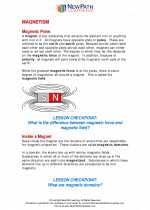 Magnetism
Magnetism  Activity Lesson
Activity Lesson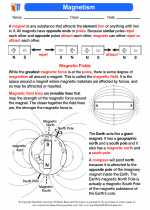 Magnetism
Magnetism  Worksheet/Answer key
Worksheet/Answer key Magnetism
Magnetism  Worksheet/Answer key
Worksheet/Answer key Magnetism
Magnetism  Worksheet/Answer key
Worksheet/Answer key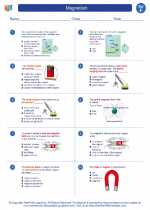 Magnetism
Magnetism  Worksheet/Answer key
Worksheet/Answer key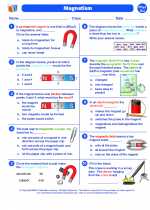 Magnetism
Magnetism  Vocabulary/Answer key
Vocabulary/Answer key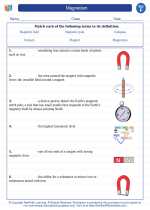 Magnetism
Magnetism 

 Activity Lesson
Activity Lesson
 Worksheet/Answer key
Worksheet/Answer key
 Worksheet/Answer key
Worksheet/Answer key
 Worksheet/Answer key
Worksheet/Answer key
 Worksheet/Answer key
Worksheet/Answer key
 Vocabulary/Answer key
Vocabulary/Answer key

The resources above cover the following skills:
EARTH AND SPACE SCIENCE
Earth’s Systems
Develop and use models of Earth’s interior composition to illustrate the resulting magnetic field (e.g., magnetic poles) and to explain its measureable effects (e.g., protection from cosmic radiation).